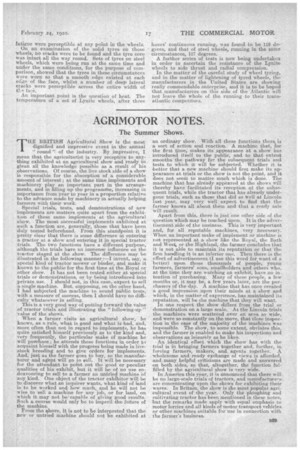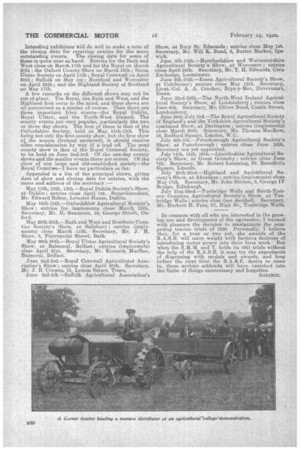• AGRIMOTOR NOTES.
Page 17

Page 18

If you've noticed an error in this article please click here to report it so we can fix it.
The Summer Shows.
THE BRITISH Agricultural Show is the most dignified and impressive -event in the annual " round " of the industry. By, impressive, I mean that the agriculturist is very receptive to anything exhibited at an agricultural show and ready to glean all the knowledge possible as a result of his observations. Of course, the live stock side of a show is responsible for the absorption of a, considerable amount of interest ; at the same time implements and. machinery play an important part in. the arrangements, and in filling up the programme, increasing in importance from year to year in a proportion relative to the advance made by machinery in actually helping farmers with their work.
Special trials, tests, and demonstrations of new implements are matters quite apart from the exhibition of these same implements at the agricultural show. The most successful implements exhibited at such a function are, generally, those that have been duly teated beforehand. From this 'standpoint it is pretty clear that there is some difference in entering a tractor at a show and entering it in special tractor trials. The two functions have a different purpose, although the trials have an immense influence on the tractor sta5ed at the show. Tho difference may be illustrated in the following manner :—I invent, say, a special kind of tractor mower or binder, and make it known to the public for the first time at the Royal or other show. It has not been tested either at special trials or demonstrations, or by being introduced into private use. I should not, in this case, expect to sell a single machine. But, supposing, on the other hand, I had subjected the marline to sound public tests, with a measure of success, then I should have no difficulty whatsoever in selling.
This is a very good way of putting forward the value of tractor trials and illustrating the "following-up " .value of the shows.
When a farmer visits an agricultural show, he knows, as a rule, what is good and what is bad, and, more often than not in regard to implements, he has quite satisfied himself previously. as to the kind and, very frequently, the particular make Of machine he will purchase; he attends these functions in order to acquaint himself with the progress being made in livestoek breeding and to give orders for implements. And, just as the farmer gees to buy, so the manufacturer and agent will go to sell. It will be necessary for the attendant to point out the good or peculiar qualities of his exhibit, but it will be of no use endeavouring to sell to a farmer an untried machine of any kind. One object of the tractor exhibitor will be to discover what an inquirer wants, what kind of lend is to be worked and how much, and he will not be wise to sell a machine for any job, or for land, on which it may not be'eapable of giving good results. Such a course would only be to imperil the future of the machine.
From the above, it is not to be interpreted that the new or Untried machine should not be exhibited at an ordinary show. With all these functions there. is a sort of action and reaction. A machine that, for the first time, makes its appearance at a show has introduced itself to the public, and to that extent smooths the pathway for the subsequent trials and tests to which it will be subjected. Whether it is better that a new machine should first make its appearance at trials or. the show is not the point., and it does not seem to matter much which is done. The machine that has already appeared at the shows will thereby have facilitated its reception at the subsequent trials, while the tractor that has already undergone trials, such as those that did so well at Lincoln last year, may very well expect to find that the farmer knows all about them and that a ready sale will result.
Apart from this, there is just'one other side of the question which may be touched upon. It is the advertisement side of the business. This is very important and, for all reputable machines, very necessary. When an important make of implement or machine is not represented at a show like the Royal, the Bath and West, or the Highland, the farmer concludes that it is not able to maintain its reputation or that the firm handling it is an inferior one. Then there is the effect of advertisement (I use this word for want of a better) upon those thousands of people, young farmers, farmers' sons, smallholders and others who, at the time they are watching an exhibit, have no intention of purchasing. Many of these people, a few months or, it may be, a few years later, are the purchasers of the day. A machine that has once created a good impression upon their ininds at a show and which, in the matter of experience, has maintained its reputation, will be the machine that they will want. In one respect the show differs from the trial or demonstration on a largo scale. At the Lincoln trials the machines were scattered over an area .B0 wide, and were so constantly on the move, that Close inspection in the case of the majority of the machines was impossible. The show; to some extent, obviates this, and the farmer is enabled to make his inspections and observations as leisurely as he likes.
• An identical effect which the show has with the trial is in bringing farmers together and, further, in forcing farmers, makers, and agents together. A wholesome and ready exchange of views is afforded, and many helpful criticisms are made and answered on both sides, so that, altogether, the function fulfilled by the agricultural show is very wide.
In America this yeareit is announced that there will be no large-scale trials of tractors, and manufacturers. are Concentrating upon the shOws for exhibiting their wares. In Britain, the show is the most. popular agricultural event of the year. Only the .ploughing and cultivating tractor has been mentioned in these notes, but the remarks made amply with equal emphasis to Motor lorries and all kinds of motor transport vehicle's or other machines suitable for use in connection with the farmeee business.
Intending exhibitors will do well to make a note of the closing date for receiving entries for the more outstanding events. The closing date for some of these is quite near at hand. Entries for the Bath and West close on March 11th and for the Royal on March '20th; the Oxford County Show on March 15th; Royal Ulster Society on April 11th; Royal Cornwall on April 28th • Suffolk on May 1st ; Hereford and Worcester on April 24th; and the Highland Society of Scotland on May 17th.
A few remarks on the different shows may not be out of place. The Royal, the Bath and West, and the Highland first occur to the mind, and these shows are all patronized as a matter of course. Then there are three important Irish events-the Royal Dublin, Royal Ulster, and the North-West Ireland. The county events are very popular, particularly the two or three day shows. The first of these is that of the Oxfordshire Society, held on May nth-12th. This being not only the first county show, but the first show of the season (Ireland excepted), it should receive some consideration by way of a lead off. The next county show is that of the Royal Cornwall Society, to be held on June 2nd-3rd. Of the one-day county shows and the smaller events there are scores. Of the show of one large and old-established society-the Royal Counties-I have no particulars so far.
Appended is a list of the principal shows, giving date of show and closing date for entries, with the name and address of the secretary : May 11th, 12th, 13th.-Royal Dublin Society's Show, at Dublin ; entries dose April 1st. Superintendent, Mr. Edward Bolum, Leinster Ho-use, Dublin.
May 12th43th.-Oxfordshird Agricultural Society's Show ; entries for implements close March 15th. Secretary, Mr. H. Sammons, 19, George Street, Oxford, May 20th-25th.-Bath and West and Southern Counties Society's Show, at Salisbury ; entries (implements) close March 11th. Secretary, Mr, J. H. Storr, 3, Pie rrepoint Street, Bath.
May 26th-28th.-Royal Ulster Agricultural Society's Show, at Balmoral, Belfast ; entries (implements) -close April 21st. Secretary, Mr, Kenneth MacRae, Bahnoral, Belfast.
June 2nd-3rd.-Royal Cornwall Agricultural Association's Show ; entries close April 28th. Secretary, Mr. J. 13. Crewes, 13, Lemon Street, Truro.
June 3rd • 4th.-Suffolk Agricultural Association's Show, at Bury St. Edmunds ; entries close May 1st. Secretary, Mr. Will K. Bond, 6, Butter Market, Ipswich.
June 8th-lOth..-Herefordshire and Worcestershire Agricultural Society's Show, at Worcester •' entries close April 24th. Secietary, kr. T. H. Edwards, Corn Exchange Leominster. June 9th-lOth.-Essex Agricultural Society's Show, at Colchester ; entries close May 12th. Secretary, Lieut.-Col. A. A. Crocker, Bryn-y-Mor, Dovercoart, • Essex. • Jane 23rd-24th.-The North-West Ireland Agricultural Society's Show, at Londonderry ; entries close June 9th. Secretary, Mr. Oliver Bond, Castle Street, Londonderry. June 29th-July 3rd.-The Royal Agricultural Society of England's and the Yorkshire Agricultural Society's combined Show, at Darlington; entries (implements) close March 20th. Secretary, Mr. Thomas MacRow, 16, Bedford Square, London, W. C. July 6th-8th.-Peterborough Agricultural Society's Show, at Peterborough; entries close June 12th. Secretary not yet appointed. July 14th, 15th, 16th.-Lincolnshire Agricultural Sa-• eiety's Shaw, at Great Grimsby; entries close June 7th. Secretary, Mr. Robert Lamming, St. Benedict's Square, Lincoln. July 20th-23rd.-Highland and Agrinitural Society's Show, at Aberdeen ; entries (implements) close May 17th. Secretary, Mr. John Stirton, 3, George IV Bridge, Edinburgh.
July 21st-22nd.-Tunbridge Wells and South-Eastern Counties Agricultural Society's Show, at Tun
bridge Wells ; entries close (not decided). Secretary, Mr. Herbert H. Pain, 87, High St., Tunbridge Wells.
In common with all who are interested in the growing use and development of the agrimotor, I learned with pleasure the decision to amalgamate the competing tractor. trials of 1920. PersonaIlY, I believe that, for a year or two yet, the awards of the R.A.S.E. will carry weight with farmers desirous of introducing motor power into their farm work. But when the S.M.M. and T. holds its 1921 trials without the help of the R.A.S.E. it may try the experiment of dispensing with medals and awards, and long before the next time the R.A. desire to come in, those archaic addenda will have vanished into the limbo of things unnecessary and forgotten. AGRIMOT.




























